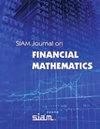Mortgage Contracts and Underwater Default
IF 1.4
4区 经济学
Q3 BUSINESS, FINANCE
引用次数: 0
Abstract
SIAM Journal on Financial Mathematics, Volume 15, Issue 2, Page 315-359, June 2024.Abstract.We analyze recently proposed mortgage contracts that aim to eliminate selective borrower default when the loan balance exceeds the house price (the “underwater” effect). We show contracts that automatically reduce the outstanding balance in the event of house price decline do eliminate selective default, but they may induce prepayment in low price states. However, low state prepayments vanish if the benefit from home ownership is sufficiently high. We also show that capital gain sharing features, such as prepayment penalties in high house price states, are ineffective as they virtually eliminate prepayment. For observed foreclosure costs, we find that contracts with automatic balance adjustments become preferable to the traditional fixed-rate contracts at mortgage rate spreads between 20–50 basis points. We obtain these results for perpetual versions of the contracts using an American options pricing methodology, in a continuous-time model with diffusive home prices. The contracts’ values and decision rules are associated with free boundary problems, which admit semiexplicit solutions.
抵押合同和水下违约
SIAM 金融数学期刊》第 15 卷第 2 期第 315-359 页,2024 年 6 月。摘要:我们分析了最近提出的旨在消除借款人在贷款余额超过房价时选择性违约("水下 "效应)的抵押贷款合同。我们的研究表明,在房价下跌时自动减少未偿余额的合同确实能消除选择性违约,但它们可能会在低价状态下诱发预付。然而,如果房屋所有权的收益足够高,低价状态下的预付就会消失。我们还表明,高房价州的预付惩罚等资本收益分享特征是无效的,因为它们几乎消除了预付。对于观察到的取消赎回权成本,我们发现当抵押贷款利率差在 20-50 个基点之间时,自动调整余额的合同比传统的固定利率合同更受欢迎。我们采用美式期权定价方法,在一个具有扩散性房价的连续时间模型中,对永久版本的合同得出了上述结果。合约的价值和决策规则与自由边界问题相关联,这些问题都有半明解。
本文章由计算机程序翻译,如有差异,请以英文原文为准。
求助全文
约1分钟内获得全文
求助全文
来源期刊

SIAM Journal on Financial Mathematics
MATHEMATICS, INTERDISCIPLINARY APPLICATIONS-
CiteScore
2.30
自引率
10.00%
发文量
52
期刊介绍:
SIAM Journal on Financial Mathematics (SIFIN) addresses theoretical developments in financial mathematics as well as breakthroughs in the computational challenges they encompass. The journal provides a common platform for scholars interested in the mathematical theory of finance as well as practitioners interested in rigorous treatments of the scientific computational issues related to implementation. On the theoretical side, the journal publishes articles with demonstrable mathematical developments motivated by models of modern finance. On the computational side, it publishes articles introducing new methods and algorithms representing significant (as opposed to incremental) improvements on the existing state of affairs of modern numerical implementations of applied financial mathematics.
 求助内容:
求助内容: 应助结果提醒方式:
应助结果提醒方式:


